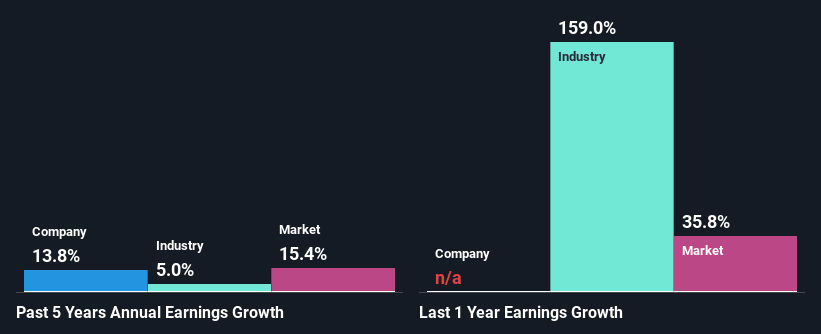Is Birchcliff Energy Ltd.'s (TSE:BIR) Latest Stock Performance A Reflection Of Its Financial Health?
Birchcliff Energy's (TSE:BIR) stock is up by a considerable 8.5% over the past week. Since the market usually pay for a company’s long-term fundamentals, we decided to study the company’s key performance indicators to see if they could be influencing the market. Specifically, we decided to study Birchcliff Energy's ROE in this article.
Return on Equity or ROE is a test of how effectively a company is growing its value and managing investors’ money. In simpler terms, it measures the profitability of a company in relation to shareholder's equity.
View our latest analysis for Birchcliff Energy
How Do You Calculate Return On Equity?
ROE can be calculated by using the formula:
Return on Equity = Net Profit (from continuing operations) ÷ Shareholders' Equity
So, based on the above formula, the ROE for Birchcliff Energy is:
14% = CA$249m ÷ CA$1.8b (Based on the trailing twelve months to September 2021).
The 'return' is the yearly profit. That means that for every CA$1 worth of shareholders' equity, the company generated CA$0.14 in profit.
Why Is ROE Important For Earnings Growth?
Thus far, we have learned that ROE measures how efficiently a company is generating its profits. Based on how much of its profits the company chooses to reinvest or "retain", we are then able to evaluate a company's future ability to generate profits. Assuming all else is equal, companies that have both a higher return on equity and higher profit retention are usually the ones that have a higher growth rate when compared to companies that don't have the same features.
Birchcliff Energy's Earnings Growth And 14% ROE
To start with, Birchcliff Energy's ROE looks acceptable. Even when compared to the industry average of 16% the company's ROE looks quite decent. This certainly adds some context to Birchcliff Energy's moderate 14% net income growth seen over the past five years.
We then compared Birchcliff Energy's net income growth with the industry and we're pleased to see that the company's growth figure is higher when compared with the industry which has a growth rate of 5.0% in the same period.
The basis for attaching value to a company is, to a great extent, tied to its earnings growth. What investors need to determine next is if the expected earnings growth, or the lack of it, is already built into the share price. This then helps them determine if the stock is placed for a bright or bleak future. Has the market priced in the future outlook for BIR? You can find out in our latest intrinsic value infographic research report.
Is Birchcliff Energy Using Its Retained Earnings Effectively?
Birchcliff Energy has a low three-year median payout ratio of 6.0%, meaning that the company retains the remaining 94% of its profits. This suggests that the management is reinvesting most of the profits to grow the business.
Besides, Birchcliff Energy has been paying dividends over a period of five years. This shows that the company is committed to sharing profits with its shareholders. Upon studying the latest analysts' consensus data, we found that the company is expected to keep paying out approximately 6.6% of its profits over the next three years.
Conclusion
In total, we are pretty happy with Birchcliff Energy's performance. Particularly, we like that the company is reinvesting heavily into its business, and at a high rate of return. Unsurprisingly, this has led to an impressive earnings growth.
Have feedback on this article? Concerned about the content? Get in touch with us directly. Alternatively, email editorial-team (at) simplywallst.com.
This article by Simply Wall St is general in nature. We provide commentary based on historical data and analyst forecasts only using an unbiased methodology and our articles are not intended to be financial advice. It does not constitute a recommendation to buy or sell any stock, and does not take account of your objectives, or your financial situation. We aim to bring you long-term focused analysis driven by fundamental data. Note that our analysis may not factor in the latest price-sensitive company announcements or qualitative material. Simply Wall St has no position in any stocks mentioned.

 Yahoo Finance
Yahoo Finance 
